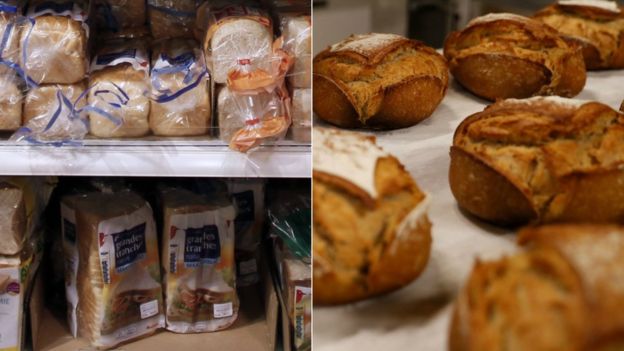A link between highly processed foods and cancer has been suggested by French researchers.
They classified foods including cakes, chicken nuggets and mass-produced bread as "ultra-processed".
A study of 105,000 people hinted the more of such foods people ate, the greater their risk of cancer.
A lot of caution is being expressed about the study, but experts said a healthy diet is best.
What counts as ultra-processed
- Mass-produced packaged breads and buns
- Sweet or savoury packaged snacks including crisps
- Chocolate bars and sweets
- Sodas and sweetened drinks
- Meatballs, poultry and fish nuggets
- Instant noodles and soups
- Frozen or shelf-life ready meals
- Foods made mostly or entirely from sugar, oils and fats

Diet is already known to affect the risk of cancer.
Being overweight is the biggest preventable cause of the disease after smoking and the World Health Organization says processed meat does slightly increase the risk of cancer.
But what about ultra-processed foods?
The team - at Universite Sorbonne Paris Cite - used food surveys on two days to work out what people were eating.

Those on the study, who were mostly middle-aged women, were followed for an average of five years.
The results, in the British Medical Journal, showed that if the proportion of ultra-processed food in the diet increased by 10%, then the number of cancers detected increased by 12%.
During the study:
- On average, 18% of people's diet was ultra-processed
- On average, there were 79 cancers per 10,000 people each year
- Upping the proportion of processed food by 10% would lead to nine extra cancers per 10,000 people per year
The researchers concluded: "These results suggest that the rapidly increasing consumption of ultra-processed foods may drive an increasing burden of cancer in the next decades."
But they said the findings need to "be confirmed by other large-scale" studies and research was needed to establish what could be behind the link.
A 'warning signal'
This study is far from the definitive take on ultra-processed foods and cancer.
It cannot say ultra-processed foods are a cause of cancer.
There are also factors that muddy the waters as people who ate a lot of ultra-processed foods had other behaviours that have been linked to cancer.
They were much more likely to smoke, were less active, consumed more calories overall and were more likely to be taking the oral contraceptive.
While the researchers did adjust their analysis for this they say their impact "cannot be entirely excluded".
Prof Linda Bauld, Cancer Research UK's prevention expert, said: "It's already known that eating a lot of these foods can lead to weight gain, and being overweight or obese can also increase your risk of cancer, so it's hard to disentangle the effects of diet and weight."
Overall she said the study was a "warning signal to us to have a healthy diet" but people should not worry about eating a bit of processed food "here and there" as long as they were getting plenty of fruit, vegetables and fibre.
Dr Ian Johnson, from the Quadram Institute in Norwich, said the study had "identified some rather weak associations".
But he criticised the vagueness of the term ultra-processed.
He said: "The problem is that the definition of ultra-processed foods they have used is so broad and poorly defined that it is impossible to decide exactly what, if any, causal connections have been observed."
For Prof Tom Sanders at King's College London, the definition of ultra-processed foods throws up too many quirks.
He said mass-produced bread would be classed as ultra-processed, but a home-made loaf or bread from a posh local bakery would not.
"This classification seems arbitrary and based on the premise that food produced industrially has a different nutritional and chemical composition from that produced in the home or by artisans. This is not the case," Prof Sanders said.
Even the accompanying commentary in the British Medical Journal warned against jumping to conclusions.
Martin Lajous and Adriana Monge from the National Institute of Public Health in Mexico, warned "we are a long way from understanding the full implications of food processing for health and well-being".
They said the study was simply "an initial insight".
Latest Stories
-
COCOBOD CEO assures completion of all projects in Western North region
5 mins -
Bawumia has served Ghana well, let’s give him another chance – Ahiagbah
8 mins -
Special voting ballots won’t be counted until December 7 – EC
14 mins -
The Ark Foundation makes recommendations to government on gender-based violence
14 mins -
Let’s retire Mahama; he’s an example of the biblical wicked and lazy servant – Ahiagbah
19 mins -
WAICA Education Conference 2024 addresses AI and the future of insurance
32 mins -
New Force Movement campaign team reportedly attacked by angry youth in Sowutuom
36 mins -
Harness media power to boost tourism – Deputy Tourism Minister to Ghanaians
42 mins -
ECG denies allegations of fraudulent activities in Nkawkaw Municipality
45 mins -
Election 2024: EC to deny newspapers, online portals access to collation centres
49 mins -
Metro TV incident: Randy Abbey explains what happened
52 mins -
From reactive to proactive: How data-driven insights are redefining risk assessment in insurance – Coronation Insurance
57 mins -
I was advised to do drugs so I could go wild on stage – Safo Newman
1 hour -
Our officers escorted bailiff, judgment creditor to execute court order at Metro TV – Police
1 hour -
It’s always been my dream to do music from tertiary – Safo Newman reveals
1 hour

